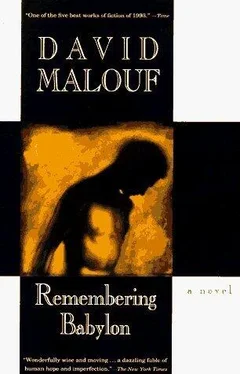‘Ah,’ she said. What struck her, almost painfully, was the blue of the flower, which was exactly that of his eyes.
‘Children still do that, you know,’ she told him, thinking of her little lost visitors; but what she was looking at was the town-boy she saw standing up in him, all his roughness gone in the tender mouth and formal, angelic pose as the song poured out and her poor mother wept.
‘Do they?’ he said, feeling a little foolish. It had been an unconscious gesture. He had forgotten the drop of sweetness, or thought he had. Something in him had not.
Over the five weeks since his first visit they had settled on a favourite spot in the garden. It was here that she led him.
A balustraded terrace, much decayed and minus its urns, looked down beyond marble steps to a lawn. The left side of it was laid out as a chessboard, squares of black and white marble — the white veined with black, the black with white — of which some had tilted and others were split, with clumps of dark-leaved yellow-flowering clover in the cracks. Along one side was a bench, also of marble, in the shape of a sofa, with bolster-like arms, clawed feet, and in the panels a pair of plump-cheeked scowling cherubs. It was out of the sun but in sight of her hives, which stood in the lower garden beyond a row of scrubby apple trees and a giant mulberry.
‘Do you mind?’ he asked. But it was a formality; he did not wait for her permission, but removed his jacket and sat, heavy-shouldered and shaggy, in shirtsleeves and vest. His hands and forehead you saw, now that he looked so much like a workman, were scabbed from the sun.
After a moment she slipped her hand into the depths of her habit and found an apple, a Granny Smith.
He made a little gesture of surprise, as if the apple were special rather than the established opening it had become to their talk. ‘What a beauty!’ he said. He turned it in his loose-skinned hand, then raised it to his nose and sniffed.
She watched him take the penknife from his pocket, unclasp it, and very cleanly, cutting in towards the core, remove a crisp little green-skinned wedge, which he offered her on the end of the knife. When she shook her head, he slipped it into his mouth and very slowly chewed. She was conscious of the sunspots on his hands, the scabs; like her own, like her father’s — the wrong skin for this country.
The way of cutting an apple too was her father’s. It was to see it again and experience the tender pleasure it gave her, that she had, each time now after the first, brought an apple for him. It was his reaching up that first day in the orchard and plucking one of their hard little apples, and sitting himself down and cutting into it, that had, almost by chance, re-established the continuity in their lives, and created, with an immediacy they might not otherwise have managed, this intimacy between them.
They had seen little of one another over the years. His place in the House, then later as a Minister, meant he had always been in view, but only in a public way. It was her mother, and later Meg, who had passed on family news. Then, two years ago, when one of her contacts was threatened because of the war, she had, presuming on their closeness, written him a letter, asking if he could use his influence with the authorities who, as she put it, were being more than usually stupid. It did not occur to her that it might harm him.
Her contact was a Catholic priest in Jena, whose work touched on her own, but whose doctorate, the backing of his order, and a university laboratory to consult, meant he was better placed than she was to answer certain questions that had engaged her for nearly thirty years.
It seemed absurd, she wrote, that the business of nations (these were early days, before the full horror had come to them) should get in the way of work that had only to do with nature ; which knew nothing, cared nothing either, for the little laws of men — even statesmen. There was, she assured him, no code involved in the information she and her priest were passing back and forth; or rather, there was a code, but they had not cracked it, and she doubted whether the Commonwealth censors would either, unless they happened to be bees. She had no reason to believe her priest (however patriotic he might be — she too was patriotic, up to a point) was any more dangerous as a German, and a Roman, than she was as an Australian and a mere woman and nun … All this in a hasty, rather untidy hand, and all of it evocative enough of what he had known of her over the years to make him smile at the bossiness, the mixture of appeal to his power and large-handed dismissal of its sphere.
He kept it by him and read it again, not much interested, frankly, in the problem, but to get the quality of her, which was so tart on the page, and which took him back to his boyish self, and her, and all that time of painful beginnings.
He did reopen the way to her alien contact, then wrote in a more personal way to say that he had heard of her work, which was not quite so obscure as she believed, and how pleased her mother and father would have been — it seemed strange, after so long, to recall these guardian figures, these ghosts of a lifetime ago — and went on, having evoked the spirit of family, to a private matter, the death of his wife, which had occurred just seven months before. He wondered if he might come one day and visit her. Did the order permit that? Only, of course, if it was permissible and she herself did not mind.
She was surprised, reading his letter, by its courtesy, its tentativeness, its tenderness she might have said, and recalling her own prickly tone felt foolish; all the more because she knew it had less to do with the offence to her pride in having to beg than with her feelings for him , which were still, after so long, quite raw and unresolved.
She read and reread his letter, and meant to reply but did not. A whole year went by. Till one morning she opened the newspaper and found herself swept up in a storm of public anger, and accusation and denial, that meant they had to meet, but no longer on their own terms.
A Fortitude Valley pastry cook, Walter Goetz by name, a naturalised German, had had his windows broken the week after Paschendaele by a gang of patriotic football fans. When he complained he was himself arrested, charged with disturbing the peace, and found guilty. He and his Australian wife and four children were to be deported and their assets confiscated.
It was an ugly affair. Protest meetings were called at which inflammatory statements were made, editorials appeared, one or two men in high places, who put their names to a petition, were pointed to and pilloried. One of these was Walter Goetz’s representative, a Minister of the Crown no less, Lachlan Beattie. He was attacked in Parliament, there was a break-in at his home, someone in his own office leaked documents to the press, and among them was a letter from a nun, Sister Monica, who turned out to be Mr Beattie’s cousin, appealing, etc, etc. Sister Monica, Janet, was astonished one morning to find her letters to Father Elsheimer reproduced in all their dangerous mystery on the front page of The Courier , flight-patterns, dance-steps, points of the compass, all explicable now as the language of an international conspiracy. Most damning of all was her letter to her cousin.
Rereading it in cold print, she did find it odd. Its tone was provocative, no doubt of that, and seen in a public rather than a personal light, rather puzzling; even she had to admit that. Within an hour he had called on the telephone to apologise and reassure her. The affair really involved only himself. He was sorry she had been dragged into it. But she was ashamed. She saw at once the seriousness of the thing.
The other nuns, caught up in the excitement of it, did not; till other calls began to come in: newspapers demanding interviews, parents cancelling music lessons, anonymous voices shouting loyal obscenities. A youth on a bicycle rode up the drive, a butcher’s boy it turned out, and put a stone through one of their windows wrapped in a Union Jack.
Читать дальше












